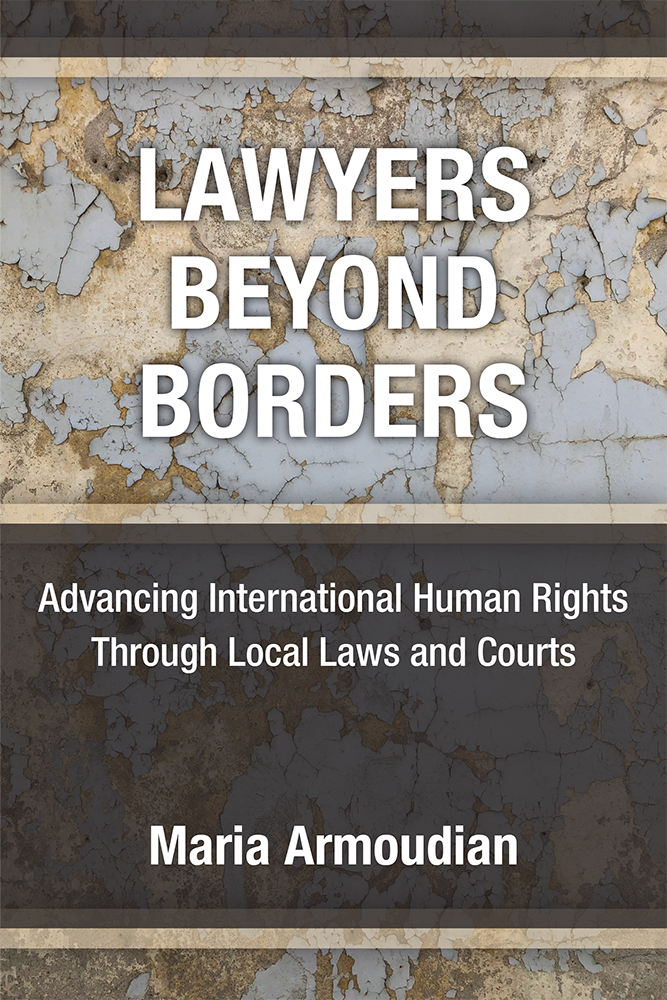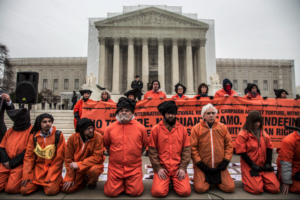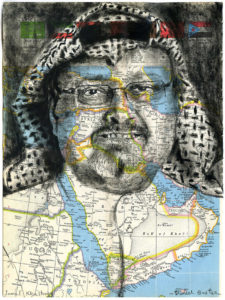
Lawyers Beyond Borders, Advancing International Human Rights Through Local Laws and Courts
By Maria Armoudian
University of Michigan Press (Sept 2021)
ISBN 9780472132560
Mischa Geracoulis
“The human rights cases in these pages are among the most unlikely ones slated for victory.”

Dismantled in a manner more dictatorial than democratic by the purportedly morally superior pulpit of the United States presidency, the guardrails of human rights came crashing down. Wielding a self-righteous vengeance beyond biblical proportions, the Bush Administration’s 9/11 “War on Terror” has indeed been terrifying. And nothing conjures up the fearsome idolatry of American exceptionalism more vividly than America’s prison camps in Guantánamo Bay.
Lawyers Beyond Borders (University of Michigan Press, September 2021), the latest book by Maria Armoudian, political historian and professor of international relations at the University of Auckland, is a journey through the history of human rights protection, defense, and failures thereof, and the innerworkings of litigious losses and unexpected victories due in large part to the efforts of a small and eclectic alliance of lawyers. Investigative, historical, and a literal who’s who in the field of human rights, Lawyers Beyond Borders is an emotional roller coaster, equally despairing and motivating. Regarding the first point, reports such as that of rendition and torture à la Gitmo, give gut-wrenching pause for reflection on the depravity of so-called civilization. On the latter point, a seemingly antiquated, centuries old United States “Alien Tort Statute” resurfaces, offering universal jurisdiction and utility, and a glimmer of hope to boot.
In relatively plain language, the Alien Tort Statute (ATS) declares that district courts shall have original jurisdiction of any civil action by an alien for a tort only, committed in violation of the law of nations or a treaty of the United States.
As it happened, in the mid-1980s interest in the Alien Tort Statue was revitalized by Congressperson Gus Yatron of Pennsylvania’s 6th district. Yatron conducted congressional hearings to discern the facilitation and reach of ATS, which, unbeknownst to him then, would prove to be fundamental to ATS application after Bush’s War on Terror justified the use of torture, nationally and internationally.
A nation once at the forefront of human rights protection, the United States of America, spectacularly turned on its professed esteemed values after 9/11. Habeas corpus—a distinguishing cornerstone of US rights, Latin for “show me the body” and meant to protect against unlawful, indefinite imprisonment—went out the window, along with rule of law, and due process. Similarly, the Bush Administration decided that none of the Geneva Convention provisions would apply in the US’ hunt for Al Qaeda in Afghanistan, and everywhere else in the world.
Unleashed by Attorney General John Ashcroft’s directives to the FBI and other US officials to profile, round up, and vigorously interrogate every Middle Eastern male between the ages of 18 and 40, and to make conditions of confinement as harsh as possible, it was all but guaranteed that detainees would be treated with brutality irrespective of any proven guilt (76). The CIA amped up its rendition program, and people went missing. Hundreds of boys and men accused of terrorism, through processes often shrouded in secrecy, were rounded up, locked up, and abused for months or years on end, many in overseas “black sites” and/or in the prison camps of Guantánamo Bay.
Most have never been charged with any crime.
Torture Is the Nasty Center of the 9/11 Case at Guantánamo
Addressing the horrors of sanctioned torture, Armoudian’s fifth chapter in particular speaks to the devolving state of human rights. Detailing just some of what’s been done to people found guilty of nothing more than being born male and within a certain timeframe and region, the US’ exuberant use of torture is stomach-turning, mind blowing, and heartbreaking. Picked up in the middle of night, or otherwise caught off guard, detainees were often whisked away without identification, rendering them untraceable by family or any would-be lawyer. One of the cases mentioned in the book, Turkmen v. Ashcroft, depicts the nightmare that men assumed to be Arab, South Asian, or Muslim, endured in the Metropolitan Detention Center in New York. After months of being slammed against walls, punched, dragged, stripped searched, raped with flashlights, denied medical treatment and communication with the outside, all were found innocent of terrorism (74).
US civil rights lawyer Clive Stafford Smith has argued, “What system do you have when a democratic government locks up a bunch of people and won’t tell you who they are?”
Eric Lewis, commercial litigator for Baach, Robinson, and Lewis, a self-professed “Ronald Reagan Republican” whose client list includes the World Bank and Abu Dhabi Commercial Bank, is quoted from a Forbes interview with journalist, David Parnell, stating that when Guantánamo Bay opened and the US began torturing people, a line had been crossed. He asserted, “Guantánamo, indefinite detention, and torture present the signature legal and moral challenges of our era.” Lewis, citing his obligation as a lawyer, joined forces with other lawyers intent on justice and the preservation of human rights.
Human rights, while related to international humanitarian law and the work of international criminal tribunals, is not about the sovereignty of states, but of individuals. Human rights articulate the agency of the individual irrespective of location, nationality, race, creed, socioeconomic status, ability, et. al. For this reason, the Alien Tort Statute, one of the oldest and still operational federal laws on the books, is applicable.
Leading US human rights litigator, Paul Hoffman, famed for his defense of victims of America’s War on Terror, confirms that ATS is an expression of the United States’ original commitment to international law, designed to prevent giving refuge to torturers, and intended to be extraterritorial (111).
Against political resistance and ideological odds, ATS has been tried, tested, and proven true to its words, evidenced most notably in a 1980s groundbreaking Paraguayan victory in the US courts. Setting something of a precedent, victims from Chile, Argentina, El Salvador, Guatemala, Peru, Honduras, Colombia, Ethiopia, Liberia, Haiti, the Philippines, Bosnia, Somalia, and victims of extraordinary rendition would eventually find a similar, albeit not entirely straightforward, track to some semblance of justice.
The War on Terror provoked a multitude of lawyers from across the bar to rethink their work, including corporate defense lawyer, Susan Burke. Referring to Bush’s double-term open season on human rights, Burke remarked that the administration’s decision to use torture effectively converted a grievous human rights abuse traditionally outlawed into accepted public policy. For Burke and other lawyers, this was a turning point in how and why they do their work (90).
US lawyers took up impossible cases, searching for missing boys and men, eventually representing hundreds of “powerless aliens in jurisdictional black holes.” Taking the lead on confronting the US government’s decimation of human rights protections, Clive Stafford Smith, civil rights lawyer Joseph Margulies, and president of Center for Constitutional Rights, lawyer Michael Ratner, would ultimately inspire other US lawyers to join the cause, including Thomas Wilner of Shearman & Sterling, a law firm that represents some of the US’ largest corporations.
This handful of lawyers, even after decades of complex litigation, seemingly endless pushback and dead-end suits, threats to their lives and livelihoods, and accusations of being traitors, persist in their pursuit of justice against top US officials and attempts at recourse for torture victims. Highlighting the difficulty they face, even the sworn declaration of US Colonel Lawrence B. Wilkerson(ret.), that the Bush administration knew “the vast majority of Guantánamo detainees were innocent,” had little bearing on the 2006 Military Commissions Act. The act gave the US president absolute power to decide who would be an enemy of the state, and to imprison people with or without charge of crime, indefinitely. Wilkerson stated:
…it became apparent to me as early as August 2002, and probably earlier to other State Department personnel who were focused on these issues, that many of the prisoners detained at Guantánamo had been taken into custody without regard to whether they were truly enemy combatants, or in fact whether many of them were enemies at all. I soon realized from my conversations with military colleagues as well as foreign service officers in the field that many of the detainees were, in fact, victims of incompetent battlefield vetting. There was no meaningful way to determine whether they were terrorists, Taliban, or simply innocent civilians picked up on a very confused battlefield or in the territory of another state such as Pakistan. The vetting problem, in my opinion, was directly related to the initial decision not to send sufficient regular army troops at the outset of the war in Afghanistan, and instead, to rely on the forces of the Northern Alliance and the extremely few US. Special Operations Forces (SOF) who did not have the necessary training or personnel to deal with battlefield detention questions or even the inclination to want to deal with the issue.
It’s worth reading further from Wilkerson’s 2010 nine-page statement that points to incompetent vetting, resulting in myriad cases of wrongful seizure and detainment.
“Procedural grounds prevented all civil actions [including ATS litigation] for the tortured, abused, wrongfully detained, or killed in [the War on Terror] from reaching their merits” (89). With remedies exhausted in US courts for US-based violations, Center for Constitutional Rights lawyers sought out alternatives that included suing private, for-profit military corporations, CACI International, Inc. and Titan Corporation, their subsidiaries companies, and the individuals retained to translate, interrogate, and guard at Abu Ghraib prison in Iraq.
While war in and of itself is a redistribution of wealth, “[t]hese contractors are for-profit corporations,” explains Center for Constitutional Rights lawyer, Katherine Gallagher. “Is war for profit?” she asks rhetorically. In a monetized prison system where profits multiply by the number of incarcerations, many and indefinite detentions would imply a resounding yes.
In Saleh v Titan, representing more than 200 detention and torture survivors of Abu Ghraib, Center for Constitutional Rights lawyers have used international, federal and state laws, including ATS, Racketeer Influence and Corrupt Organizations (RICO), the US Constitution, and common law torts to petition for a permanent injunction, declaratory relief, and compensation. A class action lawsuit was filed in the US District Court for the Southern District of California on behalf of 256 Iraqi civilians who were subjected to rape, torture, electrical shocks, abuses to genitals, beatings with guns and other hard objects, being urinated on, and forced watching of a parent tortured to death (92).
Similar facts from other detention sites have come to light, and similar suits have been filed to mixed and insufficient results. When survivors of secret renditions emerged and their stories were corroborated from outsiders regarding flights, personnel, air space clearance, unlawful imprisonment, detention, and torture, “the Bush administration intervened, motioning for dismissal, arguing to protect ‘state secrets’” (101).
Part and parcel to political backlash in the US, courts are packed with judges who’ve instituted higher legal barriers to the advancement and protection of human and civil rights, accorded individual rights to corporations without requiring the same responsibilities, and garnered ever more privilege for the super-rich. Access to courts has tightened, and cases can languish for years, which is worrying, given that legal professor, Charles Epp, maintains that the advancement and protection of individual human rights requires access to the courts, and works better from bottom-up rather than top-down (159).
Discussing this backlash, Rula Jebreal, foreign policy analyst and journalist, in a September 2021 interview with Democracy for the Arab World Now communications director, Omid Memarian, argued that, “American failures in Afghanistan and the wider War on Terror have reverberated back in the United States [via] Donald Trump’s presidency, and culminating in the January 6 assault on the Capitol in Washington by his extremist supporters… Authoritarianism [has not stayed] in the Middle East—it’s come back to haunt America’s democracy…. [And the corporate] media establishment [claims to be] progressive, pro-democracy, pro-multicultural domestically; but when it comes to brown, black, or Muslim people overseas, [the corporate media] actually endorses authoritarianism.”
Correspondingly, human rights strategies and tools have necessarily shifted, and the principle of universal jurisdiction in cross-border strategies is a method of choice. Inspired by ATS and determined to remedy the failure to hold top US officials accountable for torture, Peter Weiss and other human rights lawyers, have found comparable laws in other countries that provide for universal jurisdiction, and courts capable of prosecuting heinous international crimes, including torture, terrorism, and genocide (125). Such strategies have yielded indictments, arrests, and judgments previously assumed impossible in the EU, UK, and the Americas. Still, countless victims remain without resolution.
That rights are created, and can therefore be un-created, is a reality well understood by human rights advocates. Encapsulating the thesis of Lawyers Beyond Borders, Jebreal contends that human rights are mere words; action makes them meaningful.
“[E]mpower civil societies, people on the ground…spend [even one percent of the Pentagon’s budget] on education, scholarships, on empowering girls and women, protecting and defending minorities and vulnerable communities, and American values. Rejoin the Iran nuclear deal, and negotiate with the Israelis…condition US aid to respect human rights and democratization, and end apartheid. America cannot be hypocritical anymore…It’s time to choose truth.”
But after twenty years of the War on Terror, Jebreal isn’t convinced that there will ever be any real accountability.
To her point, the jury is still out as to whether human rights are experiencing a rebirth, or if they’ve reached the sad autumn of life. Moreover, it’s repeated ad nauseum that we live in a post-truth era. Thus, we find ourselves at a critical juncture when, insists Armoudian, “agency, ideas, and information matter” most. Advocacy must change with the times and embrace cross-border collaborations to produce new systems and structures that revive rights and uphold a “working rule of law that leaves no one above the law and no one below it” (162).
Innovations in globalized justice is exemplified by the coalition that originated between Peter Weiss and Wolfgang Kaleck, US and German lawyers respectively. With far-reaching networks in the US and European legal systems, their combined efforts developed into the European Centre for Constitutional Human Rights, which in turn collaborates with other nongovernmental organizations, like Human Rights Watch and TRIAL International, in pursuit of democratic, social standards and values worldwide. As part of a “network of solidarity,” atrocity survivors are now better able to seek redress through interstate courts (126-128).
All told, Lawyers Beyond Borders is a hard reality check to my GenX idealism. Countering the post-truth-era adage with the one that says sunlight is the best disinfectant, I am somewhat reassured by the transnational efforts of human rights lawyers and cosmopolitan conflict resolution strategists. Armoudian affirms that their use of “existing laws to challenge injustices within political-legal systems on behalf of [humanity], entire client constituenc[ies], and for future generations, human rights lawyers will find solutions to conscience-shocking problems,” including the indelible sins that are prisons like Gitmo, Abu Ghraib and untold black sites whose names may never be fully catalogued.


















